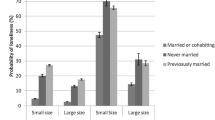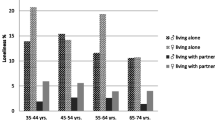Abstract
Objective
Examine the association of physical impairment with gender, depression, and socio-demographics in the community in Aleppo, Syria.
Method
We conducted a cross-sectional, population-based study in Aleppo on adults aged 18–65 (N = 2,038). We used a computerized interviewer-administered structured questionnaire. Physical impairment was measured via an adapted 12-item World Health Organization, Health State Description Individual Questionnaire which includes both physical and emotional items. We used physical impairment items score to classify individuals into low, middle, and high physical impairment category. Self-report of physician-diagnosed depression and chronic diseases active in the past year and their current treatment status were obtained.
Results
Sample mean age (SD) was 35.3 (12.1) years, 55% were female, and 4.5% had depression. Female gender, low socioeconomic status (SES), and depression were associated with high physical impairment. Women had more impairment (OR = 3.35, 95% CI: 2.15–5.21) with little change after controlling for depression and chronic diseases, but significantly decreased after controlling for socio-demographics (OR = 1.51, 95% CI: 0.84–2.73). The association with low (vs. high) SES was prominent (OR = 2.48, 95% CI: 1.32–4.67) after controlling for all variables. Depression’s association (OR = 4.85, 95% CI: 1.93–12.15) lost significance after controlling for chronic diseases (OR = 2.81, 95% CI: 0.96–8.25), but further adjustment for socio-demographics had little effect.
Conclusion
Women and individuals of low SES appear more vulnerable to physical impairment in the community in Aleppo. Depression’s association with physical impairment may be mediated through co-existing chronic diseases. Public health planning regarding physical impairment in Syria should encompass these as putative risk factors.
Similar content being viewed by others
References
Balestrieri M, Carta MG, Leonetti S, Sebastiani G, Starace F, Bellantuono C (2004) Recognition of depression and appropriateness of antidepressant treatment in Italian primary care. Soc Psychiatry Psychiatr Epidemiol 39:171–176
Ballantyne PJ (1999) The social determinants of health: a contribution to the analysis of gender differences in health and illness. Scand J Public Health 27:290–295
Baune BT, Adrian I, Jacobi F (2007) Medical disorders affect health outcome and general functioning depending on comorbid major depression in the general population. J Psychosom Res 62(2):109–118
Brown C, Schulberg HC (1998) Diagnosis and treatment of depression in primary medical care practice: the application of research findings to clinical practice. J Clin Psychol 54:303–314
Buist-Bouwman MA, De Graaf R, Vollebergh WA, Alonso J, Bruffaerts R, Ormel J, ESEMeD/MHEDEA 2000 Investigators (2006) Functional disability of mental disorders and comparison with physical disorders: a study among the general population of six European countries. Acta Psychiatr Scand 113(6):492–500
DiMatteo MR, Lepper HS, Croghan TW (2000) Depression is a risk factor for noncompliance with medical treatment. Meta-analysis of the effects of anxiety and depression on patient adherence. Arch Intern Med 160:2101–2107
Druss BG, Rosenheck RA, Sledge WH (2000) Health and disability costs of depressive illness in a major U.S. corporation. Am J Psychiatry 157(8):1274–1278
Fouad MF, Rastam S, Ward KD, Maziak W (2006) Prevalence of obesity and its associated factors in Aleppo, Syria. Prev Control 2:85–94
Hammal F, Mock J, Ward KD, Fouad MF, Beech BM, Maziak W (2005) Settling with danger: conditions and health problems in peri-urban neighbourhoods in Aleppo. Syria Environ Urban 17:113–125
Hays RD, Wells KB, Sherbourne CD, Rogers W, Spritzer K (1995) Functioning and well-being outcomes of patients with depression compared with chronic general medical illnesses. Arch Gen Psychiatry 52(1):11–19
Kalton G (1983) Introduction to survey sampling (quantitative applications in the social sciences). SAGE Publications, Thousand Oaks
Kilzieh N, Rastam S, Maziak W, Ward KD (2008) Comorbidity of depression with chronic diseases: a population-based study in Aleppo, Syria. Int J Psychiatry Med 38(2):169–184
Mackenbach JP, Borsboom GJJM, Nusselder WJ, Looman CWN, Schrijvers CTM (2001) Determinants of levels and changes of physical functioning in chronically ill persons: results from the GLOBE Study. J Epidemiol Community Health 55:631–638
Martikainen P, Stansfeld S, Hemingway H, Marmot M (1999) Determinants of socioeconomic differences in change in physical and mental functioning. Soc Sci Med 49(4):499–507
Maziak W, Ward KD, Mzayek F, Rastam S, Bachir ME, Fouad MF, Hammal F, Asfar T, Mock J, Nuwayhid I, Frumkin H, Grimsley F, Chibli M (2005) Mapping the health and environmental situation in informal zones in Aleppo, Syria; report from the 1st Aleppo Household Survey. Int Arch Occup Environ Health 78:547–558
Murray CJL, Salomon JA, Mathers CD, Lopez AD (eds) (2002) Summary measures of population health: concepts, ethics, measurement and applications. WHO, Geneva
Ormel J, Vonkorff M, Oldehinkel AJ, Simon G, Tiemens BG, Ustun TB (1999) Onset of disability in depressed and non-depressed primary care patients. Psychol Med 29(4):847–853
Ormel J, VonKorff M, Ustun TB, Pini S, Korten A, Oldehinkel T (1994) Common mental disorders and disability across cultures. Results from the WHO Collaborative Study on Psychological Problems in General Health Care. JAMA 272(22):1741–1748
Paperwalla KN, Levin TT, Weiner J, Saravay SM (2004) Smoking and depression. Med Clin North Am 88:1483–1494
Polsky D, Doshi JA, Marcus S, Oslin D, Rothbard A, Thomas N, Thompson CL (2005) Long-term risk for depressive symptoms after a medical diagnosis. Arch Intern Med 165:1260–1266
Sartorius N (2003) Physical symptoms of depression as a public health concern. J Clin Psychiatry 64 Suppl 7:3–4
Scott KM, Von Korff M, Alonso J, Angermeyer MC, Bromet E, Fayyad J, de Girolamo G, Demyttenaere K, Gasquet I, Gureje O, Haro JM, He Y, Kessler RC, Levinson D, Medina Mora ME, Oakley Browne M, Ormel J, Posada-Villa J, Watanabe M, Williams D (2008) Mental-physical co-morbidity, its relationship with disability: results from the World Mental Health Surveys. Psychol Med 26:1–11
Simon GE (2003) Social and economic burden of mood disorders. Biol Psychiatry 1 54(3):208–215
Simon GE, Von Korff M, Lin E (2005) Clinical and functional outcomes of depression treatment in patients with and without chronic medical illness. Psychol Med 35(2):271–279
Stein MB, Cox BJ, Afifi TO, Belik SL, Sareen J (2006) Does co-morbid depressive illness magnify the impact of chronic physical illness? A population-based perspective. Psychol Med 36(5):587–596
Sutor B, Rummans TA, Jowsey SG, Krahn LE, Martin MJ, O’Connor MK, Philbrick KL, Richardson JW (1998) Major depression in medically ill patients. Mayo Clin Proc 73:329–337
UNDP. The Arab Human Development Report Series (2002–2005)—an overview. Accessed June 2007 from http://www.undp.org/arabstates/PDF2005/AHDR4_04.pdf
United Nation Statistical Division (2005) Accessed July 2008 from http://unstats.un.org/unsd/hhsurveys/
Ustun TB, Ayuso-Mateos JL, Chatterji S, Mathers C, Murray CJ (2004) Global burden of depressive disorders in the year 2000. Br J Psychiatry 184:386–392
Wells KB, Golding JM, Burnam MA (1988) Psychiatric disorder and limitations in physical functioning in a sample of the Los Angeles general population. Am J Psychiatry 145(6):712–717
Wing RR, Phelan S, Tate D (2002) The role of adherence in mediating the relationship between depression and health outcomes. J Psychosom Res 53(4):877–881
World Health Survey (2000–2001) World Health Organization. Accessed June 2003 from http://www3.who.int/whs/
Wray LA, Blaum CS (2001) Explaining the role of sex on disability: a population-based study. Gerontologist 41(4):499–510
Acknowledgments
This work is supported by US Public Health Service grants R01 TW05962 and R21 TW006545; and NIDA grant R01DA024876-01. Nael Kilzieh is supported by The Fulbright Scholar Grant, Bureau of Cultural and Educational Affairs, US Department of State and the Veterans Affairs Mental Illness Research, Education, and Clinical Center (MIRECC), VISN 20.
Author information
Authors and Affiliations
Corresponding author
Rights and permissions
About this article
Cite this article
Kilzieh, N., Rastam, S., Ward, K.D. et al. Gender, depression and physical impairment: an epidemiologic perspective from Aleppo, Syria. Soc Psychiat Epidemiol 45, 595–602 (2010). https://doi.org/10.1007/s00127-009-0076-7
Received:
Accepted:
Published:
Issue Date:
DOI: https://doi.org/10.1007/s00127-009-0076-7




